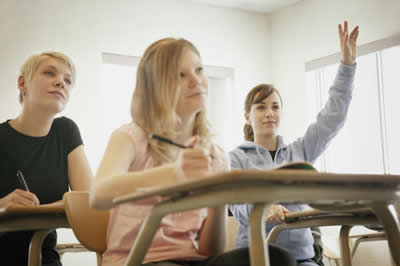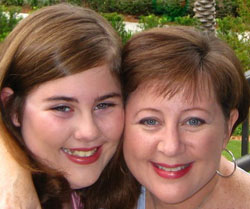|
Welcome Back!
|
We welcome John Balsley, COVT, back to the VCDC. John provided patient care at the VCDC for many years but relocated to Pittsburgh in 2006. Fortunately for us, he has moved back to the DC area and will be providing vision therapy services at our center part-time, starting with Saturdays and Tuesday afternoons. If you are in need of Saturday or Tuesday therapy hours, please contact Rita. |
|
Vision Therapy Goes High-Tech
| 
The Sanet Vision Integrator
Keeping up with technology, the VCDC is adding the SVI to the therapy toolbox. Using a 50-inch height-adjustable touch-screen,"the SVI can be used to enhance the following visual abilities: pursuits, saccades, fixation stability, eye-hand coordination, visual reaction time, speed and span of recognition, automaticity, and contrast sensitivity, plus visual and auditory sequencing and memory. In addition it is extremely effective when working with visual acuity improvement in patients with amblyopia, ABI (acquired brain injury) patients with visual field loss, visual-spatial neglect, and visual-vestibular integration problems, and with patients with rhythm, reading, and math problems." See a video demonstration HERE. The SVI will be available the first week of December. |
|
Board Certification
| 
The VCDC applauds its newest Fellow in the College of Optometrists in Vision Development, Dr. Zeller, and newest Certified Optometric Vision Therapist, Matt Hiller. Dr. Zeller and Matt were honored at the 2011 annual COVD conference last month in Las Vegas. The COVD International Examination and Certification Board process includes a rigorous evaluation of the eye care professional's knowledge and abilities in providing developmental and behavioral vision care for patients. Optometrists who successfully complete their certification process are Board Certified in Vision Development and Vision Therapy and are designated Fellows of COVD (FCOVD). Vision therapists are certified to work with COVD Fellows as Certified Optometric Vision Therapists (COVT). Previous VCDC honorees include Dr. Green, FCOVD; Corrina Maslanka, COVT; Rich Miller, COVT; Kate Kinsey, COVT; and John Balsley, COVT. For a complete list of 2011 honorees, click HERE. |
|
| Greetings!
The doctors and staff at the Vision & Conceptual Development Center want to wish you the best this holiday season. We hope you had a peaceful and joyful Thanksgiving.
|
|
Parent and Professional Seminar
 How does vision affect learning? How does vision affect learning?
Does your child have the 17 visual skills necessary for classroom success?
- Can a bright child do poorly in reading, writing, spelling, math?
- Can a bright child have low self-esteem and feel he/she is "stupid" and disappointing to parents and teachers?
- Can a bright child spend hours struggling to complete school assignments?
- Can a bright child be smart in everything but school?
Yes, if she has an undetected vision problem! (PAVEvision.org)
Learn more on Thursday evening, December 8, at 7pm. Please RSVP by emailing Rita@VCDCwashington.com.
|
Attention Parents: A Word About Toys
 If children play too many computer games and watch too much TV or movies, they don't get the necessary opportunities to develop the visual skills that are critical to academic success. We have seen a lot of children throughout the year, who were struggling in school because of poorly developed visual skills. Fortunately we were able to help them, but we know there are millions of children out there who are still struggling. Keep in mind that seeing 20/20, or passing a vision screening, only means that your child can see the letters on the eye chart she is supposed to see from 20 feet away. Vision screenings do not test all the visual skills vital for learning. Having said that, it's time to talk about toys! Most toys are designed for play within a distance of 18 to 24 inches. Visual developmental also requires outdoor activities, such as playing catch, T-ball, badminton, tennis, etc. This holiday season, you can help your child by looking for toys to help with: building eye-hand coordination, shape and size discrimination (important for reading), general movement skills (for everything from writing to sports), left/right awareness (vital in avoiding reversals), visual thinking, visualization, and visual memory skills (enable us to develop concepts). See the list of toys and games that help develop visual skills critical to reading and learning. |
Dyslexia & Vision
 When a child struggles with reading and learning it is important to first rule out the possibility of a vision problem. If a vision problem exists, treatment may involve glasses, optometric vision therapy, or both. Optometric vision therapy treats vision problems that can interfere with learning to read, or reading to learn. Once the vision problem is treated successfully, tutoring and other special services can become more effective. According to pediatrician and parent advocate for the National Center for Learning Disabilities, Dr. Debra Walhof: "It is important to remember that normal sight may not necessarily be synonymous with normal vision...That being said, if there is a vision problem, it could be preventing the best tutoring and learning methods from working. Now that certainly doesn't mean every dyslexic child needs vision therapy, however in my opinion, skills such as focusing, tracking and others are essential foundational tools for reading. In general, if your child has trouble with reading or learning to read, getting a vision evaluation to assess these skills from a Developmental Optometrist would be a smart move." |
Jillian's Story
 In the fourth grade, Jillian's teacher described her as very bright, but in the classroom, her performance was not as good as it should have been. She was unable to finish many assignments, skipped words when she had to read out loud and daydreamed during silent reading time. Her handwriting was poor, and she frequently took bathroom breaks during math. Jillian had previously been diagnosed with amblyopia (lazy eye). She received treatment for this condition with an ophthalmologist which included wearing a patch over her good eye, but her reading, spelling & math continued to suffer. Jillian's mom, Robin, started searching on the internet for information on "vision and learning." As a result of this, she found a doctor in her area that provided a vision therapy program. The doctor confirmed that Robin was right. Jillian's problems with schoolwork were definitely due to a correctable vision problem. The results of vision therapy were no less than life changing. Jillian started doing many things that she had never done before. In order to help other families that have children who are struggling with schoolwork, they wrote a book: Jillian's Story: How Vision Therapy Changed My Daughter's Life.  Jillian and Robin Benoit were recently interviewed during a live webinar by the president of the College of Optometrists in Vision Development (COVD). They talked in more detail about Jillian's difficulties, her mother's search for help and they also share some tips for parents to help with school. Jillian and Robin Benoit were recently interviewed during a live webinar by the president of the College of Optometrists in Vision Development (COVD). They talked in more detail about Jillian's difficulties, her mother's search for help and they also share some tips for parents to help with school.
You can watch this free webinar HERE. |
Poor Report Card?
 As a parent, you definitely want to see your child succeed in school. But are you dreading his or her report card too? If so, then there are some things you need to know. Your child may be struggling in school due to undetected vision problems. Does your child: - Avoid reading or homework?
- Turn his or her head at an angle when reading?
- Have more trouble understanding what is read the longer he or she reads?
- Understand materials delivered verbally better than when read by himself or herself?
These are just a few of the symptoms. If you feel your child's report card doesn't reflect what you know your child can do, let us help. Don't wait. If a vision problem is at the root of the problem, we can help make a difference! The top 5 signs a vision problem is interfering with reading and learning: The five most common signs that a vision problem may be interfering with your child's ability to read and learn are: - Skips lines, rereads lines
- Poor reading comprehension
- Takes much longer doing homework than it should take
- Reverses letters like b's into d's when reading
- Has a short attention span with reading and schoolwork
Any one of these symptoms is a sign of a possible vision problem. Visit our website for a more in-depth symptom checklist: www.vcdcwashington.com Or attend our parent seminar on December 8th to learn more about vision and learning. |
|
Let's Stay Connected!
To stay up to date with the latest news about vision, vision therapy, 3D vision, and vision and learning - be sure to sign up for our newsletter. You can also follow us on Twitter and Facebook. 

|
|
|
From all of us at the VCDC, stay warm and cozy.
Sincerely,
|
Amanda Zeller Manley, O.D., F.C.O.V.D
Mehrnaz Green, O.D., F.C.O.V.D
Vision & Conceptual Development Center |
|
|
|